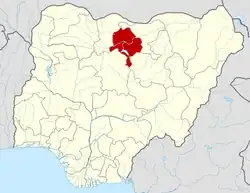Kano State Government
Kano State Government is the government of Kano State, concerned with the administration of the state ministries. The government consists of the executive, legislative and Judiciary. The government is headed by the Governor who is the policy-maker and often assisted by the Commissioners and other civil servants of the state.
Office of the Governor
The Office of the Governor was created along with the creation of the state in 1967. It is currently headed by Abba Kabir Yusuf, who is the thirteenth Governor of the State. This office is responsible for the effective coordination of all government activities for the good of the people of the State.[1]
Judiciary
The Judiciary is one of the three co-equal arms of the State Government. It is concerned with the interpretations of the laws of Kano State government.[2] The judiciary is headed by the Chief Judge of Kano State, appointed by the Governor of Kano State with the approval of the Kano State House of Assembly.[3]
Distinguished members of the Judiciary include the Attorney-General and Kano State Commissioner for Justice as well as the Chief Registrar. The Chief Registrar serves as the head of administration and accountant to the judiciary.
Courts
The Kano State courts consist of three levels of courts. The High Court is an appellate court that operates under discretionary review, meaning that the Court can choose which cases to hear by granting writs of certiorari.[4] It is the court of last resort. The other two levels are the Magistrates and the Customary Court. In addition to the court, the judiciary also consists of the Judicial Service Commission, with statutory duties that include the promotion and appointment of judicial staffs as well as other disciplinary functions.[5] The Chief Judge serves as the commission's chairman.[6]
Legislature
The legislature or state house assembly is one of the three co-equal arms of the State Government concerned with lawmaking. The legislature consists of elected members from each constituency of the state. The head of the legislature is the Speaker]], who is elected by the house.[7][8]
The building of the legislature is situated inside the Abdu Bako Secretariat Kano Municipal central business district, Kano State.
The legislative function of the legislature is to make laws by passing bills, which must be endorsed by the two-thirds majority of the house. Following the endorsement by the two-thirds majority, the bill is presented to the Governor, who will sign the bill to become law. The assembly assess and approves the annual budget of the state government on presentation by the Governor. The Assembly also plays a significant role in the appointment of the state commissioners, Chief Judges and other top officials by the Governor.[9][10]
Executive
The executive branch is one of the three co-equal arms of the State Government, concerned with policy making and implementation of bills. The executive is responsible for the daily administration of the state. Members of the executive include the Governor, Deputy Governor, and commissioners. There are also other top officials of the state, such as the head of service.
The executives overseas the ministries. Each ministry is headed and coordinated by a commissioner, assisted by a permanent secretary.
List of ministries and their commissioners
| Ministry | Incumbent commissioner |
|---|---|
| Finance | Shehu Na’Allah kura |
| Planning and Budget | Nura Mohammed iliyasu |
| Agriculture | Dr. Nasir Yusuf Gawuna |
| Water Resources | Sadiq Aminu Wali |
| Commerce, Industry, Cooperatives and Mineral Resources | Barrister Ibrahim Mukhtar |
| Tourism and Culture | Ibrahim Ahmed Karaye |
| Education | Muhammad Sunusi Kiru |
| Higher Education | Dr. Mariya Mahmoud Bunkure |
| Science and Technology | Muhammad Bappa Takai |
| Youth, and Social Development | Kabiru Ado Lakwaya |
| Environment | Dr Kabiru Getso |
| Women Affairs | Malama Zahra'u Umar |
| Health | Dr Aminu Ibrahim Tsanyawa |
| Housing and Transport | Mahmoud Muhammad |
| Local Government and Community Affairs | Murtal Sule Garo |
| Justice | Barrister Lawal Abdullahi Musa |
| Works and Infrastructure Development | Idris Garba Unguwar Rimi |
| Religious Affair | Muhammad Tahir |
| Special Duties | Mukhtar Ishaq |
| Information | Comrade Muhammad Garba |
| Rural Development | Musa Iliyasu Kwankwaso |
References
- https://www.inecnigeria.org/wp-content/uploads/2019/10/KANO-1.pdf
- Chioma, Unini (September 28, 2019). "Appointment Of Judges, Kano State Judicial Service Commission Calls For Expression Of Interest".
- "Ganduje swears-in Kano Chief Judge | Premium Times Nigeria". May 9, 2019.
- "Kano State Judiciary High Court".
- "Kano CJ appoints two acting Chief Registrar, Secretary". September 1, 2020.
- "Lagos State judges need capacity development – OJO | Newswatch Times". Archived from the original on 2015-10-17. Retrieved 2015-04-24.
- "Breaking News". June 10, 2019.
- "Kano Assembly elects new Speaker | Premium Times Nigeria". June 10, 2019.
- "Screened and confirmed the appointment of 20 commissioners nominees". November 10, 2019.
- "Kano Assembly to screen commissioner nominees Tuesday". November 4, 2019.
